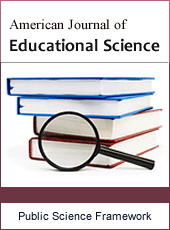American Journal of Educational Science
Articles Information
American Journal of Educational Science, Vol.1, No.4, Sep. 2015, Pub. Date: Jul. 3, 2015
Skill and Efficacy Development in a Human Services Grant Writing Course
Pages: 117-121 Views: 5832 Downloads: 1695
[01]
Melanie Horn-Mallers, Department of Human Services, California State University, Fullerton, CA, USA.
[02]
James R. Ruby, Department of Human Services, California State University, Fullerton, CA, USA.
[03]
Joe Albert Garcia, Department of Human Services, California State University, Fullerton, CA, USA.
In the field of Human Services, taking grant writing courses and developing related research and critical thinking skills are essential to successful service-related careers. This study examines how specific instructional strategies utilized in a Human Services grant writing course serve as meaningful and effective learning experiences that enhance core competencies as well as intrapersonal development. Four semester-long grant writing class sections during one academic year participated in the process. One hundred and eighty-nine, upper-division human services students participated in the study. Specific grant writing competencies increased and student intrapersonal growth was reported utilizing both quantitative and qualitative analyses.
Grant Writing, Efficacy, Instructional Strategies, Skills
[01]
Bonwell, C.C., Eison, J.A. (1991). Active learning: Creating excitement in the classroom. ASHEERIC Higher Education Report No. 1, George Washington University, Washington, DC.
[02]
Coffey, A. & Atkinson, P. (1996) Making sense of qualitative data. Thousand Oaks: Sage.
[03]
Creswell, J. W. (2007). Qualitative inquiry and research design: Choosing among five approaches (2nd ed.). Thousand Oaks, CA: Sage.
[04]
Current Population Survey (CPS), 1994 and 2007 annual averages of the total number of full-time nonagricultural private wage and salary workers employed at nonprofit organizations.
[05]
Eissenberg, T. (2003). Teaching successful grant writing to psychology graduate students. Teaching of Psychology, 30, 328-330.
[06]
Feden, P., & Vogel, R. (2003). Methods of teaching: Applying cognitive science to promote student learning, McGraw Hill Higher Education.
[07]
Felder, R., Brent, R. (1996). Navigating the bumpy road to student-centered instruction. College Teaching, 44, 43-47.
[08]
Foundation Center (2010). How many non-profit organizations are there in the United States. http://foundationcenter.org/getstarted/faqs/html/howmany.html
[09]
Froyd, J.E. (2007). Evidence for the efficacy of student-active learning pedagogies. Texas A&M University, Course Curriculum& Laboratory Improvement Conference, 2008.
[10]
Griffith, J.D., Hart, C.L., & Goodling, M.M. (2006). Teaching grant writing with service learning. International Journal of Teaching and Learning in Higher Education, 18, 3, 222-229.
[11]
Hadjistavropoulos, T.,& Bieling, P. J. (2000). When reviews attack: Ethics, free speech, and the peer review process. Canadian Psychology,41, 152–159.
[12]
Internal Revenue Service Data Book 1997, Publication 55B (Internal Revenue Service), table 27; available on the Internet, at: http://www.irs.gov/taxstats/article/0,,id=97216,00.html.
[13]
Johnson, D., Johnson, R. & Smith, K. (1998). Active learning: Cooperation in the college classroom, 2nd ed., Interaction Book Co., Edina, MN.
[14]
Johnson, D., Johnson, R. & Smith, K. (1998). Cooperative learning returns to college: What evidence is there that it works? Change, Vol. 30, No. 4, July/Aug., p. 26–35.
[15]
Kleinfelder, J., Price, J. H., & Dake, J. A. (2003). Grant writing: Practice and preparation of university health educators. American Journal of Health Education, 34, 47-53.
[16]
McKenzie, J. (1999). Beyond technology: Questioning, research and the information literate school. Bellingham, WA: FNO Publishing.
[17]
Millis, B. & Cottell, P. (1998). Cooperative learning for higher education faculty. American Council on Education, ORYX Press.
[18]
Medina-Walpole, A., Barker, W. H., & Katz, P. R. (2004). Strengthening the fellowship training experience: Findings from a national survey of fellowship trained geriatricians 1990-1998. Journal of the American Geriatrics Society, 52, 607-610.
[19]
Moustakas, C. (1994). Phenomenological research methods. Thousand Oaks, CA: Sage Publishing.
[20]
Online Collaborative Learning in Higher Education, http://clp.cqu.edu.au/glossary.htm, accessed 3/10/2009.
[21]
Parker, J., Taylor, G. and Bagby, M. (2001). The relationship between emotional intelligence and alexithymia. Personality and Individual Differences 30, 107–115.
[22]
Prince, M. (2004). Does active learning work? A review of the research. Journal of Engineering Education, July, pp. 223-231.
[23]
Puig, M. E., & Downey, E. P. (2001). Integrating grant writing skills into human service research curriculum: Promoting generative and anchored learning. Human Service Education, 21, 11-19.
[24]
Raines. C. (2003). Connecting generations: The sourcebook for a new workplace. Rochester, NY: Crisp Publications.
[25]
Ruby, J.R. (2005). Constraints to master’s level practitioner research: A literature review. Counseling and Clinical Psychology Journal, 22, 59-67.
[26]
Ruhm, C.J. & Borkoski, C. (2003). Compensation in the nonprofit sector. The Journal of Human Resources, Autumn, 992-1021.
[27]
Stage, F., Muller, P., Kinzie, J., Simmons, A. (1998). Creating learning centered classrooms: What does learning theory have to say? Washington, DC: George Washington Univ.,
[28]
Graduate School of Education and Human Development, ERIC Clearinghouse on Higher Education. [ED422777]
[29]
Sternberg, R. J. (2002, January). On civility in reviewing. APS Observer,15, 3.
[30]
Taylor, G.J., Bagby, R.M. and Parker, J.D. (1997). Disorders of affect regulation. Cambridge, MA: Cambridge University Press.
[31]
Vygotsky, L. S. (1978). Mind in society: The development of higher psychological processes. Cambridge, MA: Harvard University Press
[32]
Wooley, S. F. (2004). A review committee as a way to teach grant writing skills. American Journal of Health Education, 35, 366-368.
[33]
Zins, J.E., Payton, J.W., Weissberg, R.P., & O'Brien, M.U. (2007). Social and emotional learning and successful school performance. In G. Matthews, M. Zeidner, & R. D. Roberts (Eds.), The science of emotional intelligence: Knowns and unknowns. New York: Oxford University Press.

ISSN Print: 2381-7127
ISSN Online: 2381-7135
Current Issue:
Vol. 6, Issue 2, June Submit a Manuscript Join Editorial Board Join Reviewer Team
ISSN Online: 2381-7135
Current Issue:
Vol. 6, Issue 2, June Submit a Manuscript Join Editorial Board Join Reviewer Team
| About This Journal |
| All Issues |
| Open Access |
| Indexing |
| Payment Information |
| Author Guidelines |
| Review Process |
| Publication Ethics |
| Editorial Board |
| Peer Reviewers |


